When children enter the child protection system, they risk losing more than just their immediate caregivers - they can also lose connection to family, culture, and identity. With over half of Australia’s population either born overseas or having a parent born overseas, many children in care have important family ties beyond our borders.
International Social Service (ISS) Australia works to prevent these connections from being lost, seeking to reunite children with extended family wherever they may be.
Whether it’s placing a child with kin overseas or helping them stay in touch with family members, ISS’s work is testament to the belief that relationships matter.
A global network making connections possible
There are over 45,000 children currently in out-of-home care in Australia, and many have extended family living overseas. ISS Australia helps maintain these family connections by leveraging its position as the independent Australian arm of the global ISS network operating in over 140 countries.
By working with qualified professionals overseas who understand local child protection systems, legal frameworks, and cultural contexts, ISS undertakes essential cross-border casework. This includes locating and interviewing extended family members, assessing their viability as carers, and conducting comprehensive kinship care assessments. These international partnerships provide the local expertise and on-the-ground support needed to build connections between child protection systems.
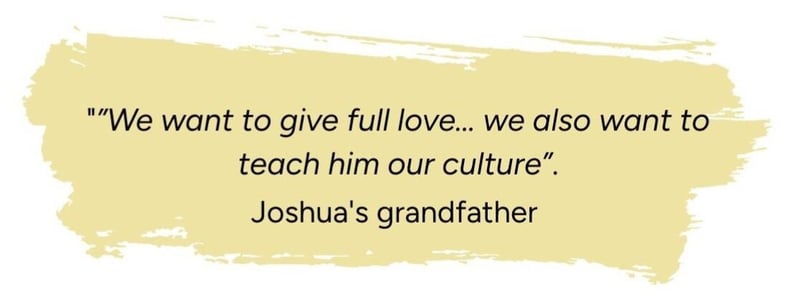
Case Study: Joshua's journey to belonging
Ten years ago, baby Joshua had no family placement options in Australia and his future was uncertain. ISS stepped in to explore international kinship care possibilities. Through their diligent efforts, they located Joshua's extended family in Borneo. After thorough assessments and collaboration with international partners, Joshua was placed with his maternal grandparents. This placement is allowing him to grow up within his cultural context - surrounded by family, preserving his heritage and providing him with a stable, loving environment.
>> Watch the video to learn more about Joshua’s journey to belonging
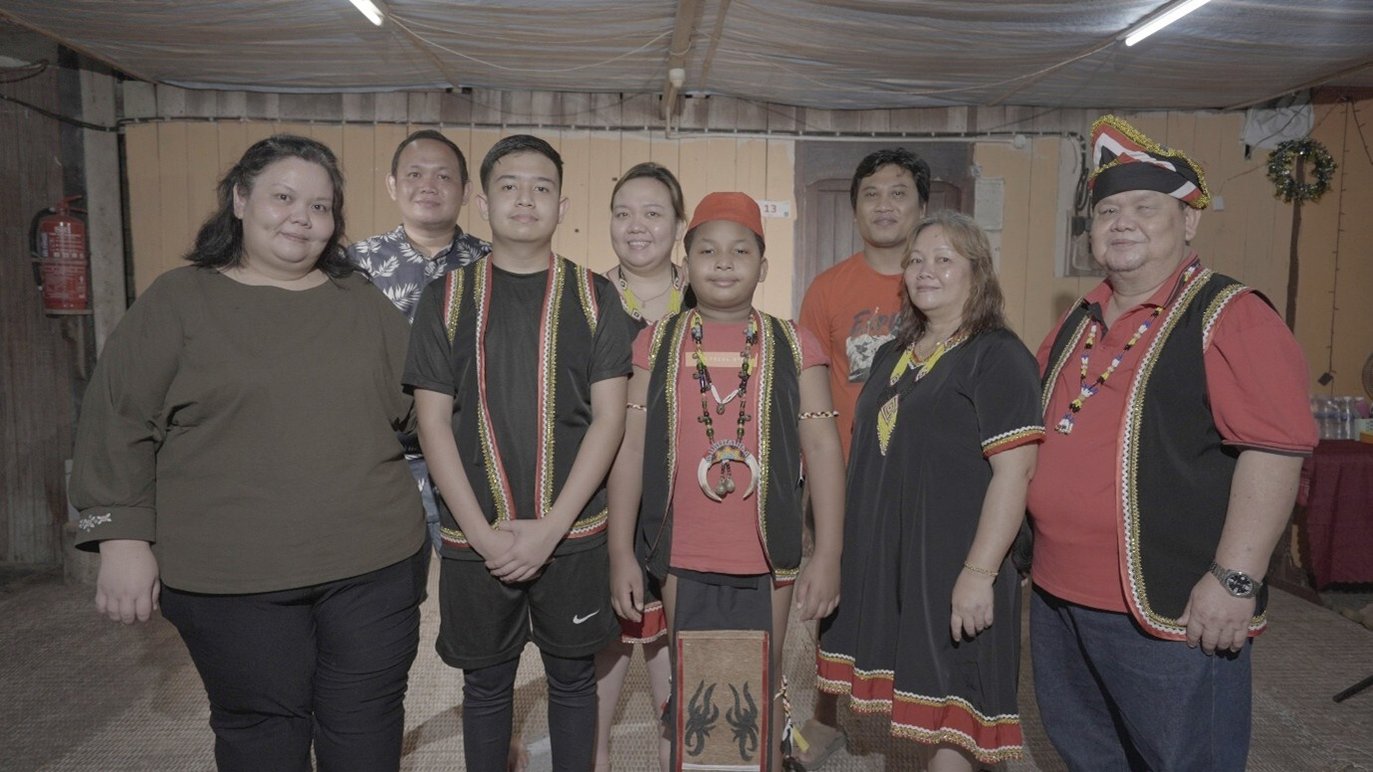
The role of caseworkers in building connections
ISS Australia encourages child protection caseworkers from both state government child protection departments and non-government service providers (NGOs) to actively explore family placement options across international borders. Where cross-border casework is possible, children may be supported to establish meaningful relationships with their overseas relatives, or those family members may be assessed as potential carers.
Promoting international family connections aligns with Australia's obligations under the UN Convention on the Rights of the Child - particularly the child's right to know and be cared for by their family, regardless of where they live. Maintaining cultural identity is also fundamental to a child's emotional, social, and psychological wellbeing.
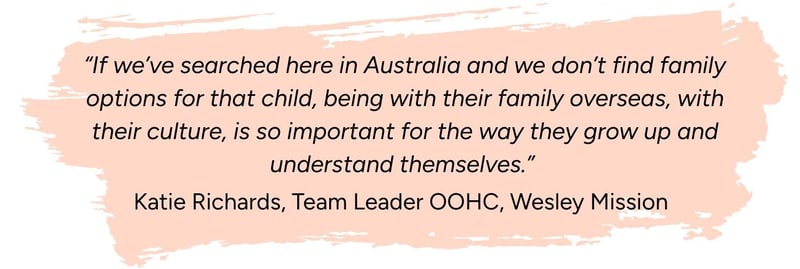
Overcoming challenges and bias
One of the greatest challenges ISS faces is encouraging caseworkers to consider overseas family placements or connections. Child protection caseworkers are often overwhelmed, responding to constant crises, which can leave little time to explore the complexities that come with international options. As a result, international kinship care is often seen as 'too hard' or unfamiliar.
Even when positive kinship assessments are received, there can be significant reluctance to place children with family members in developing countries. This hesitation is often shaped by unconscious bias, where decision-makers assume that remaining in a local Australian placement is inherently safer or preferable for the child.
Such bias is frequently reinforced by limited understanding about cultural norms, social service systems, and child protection practices in other countries. Overcoming these challenges requires ongoing education, advocacy, and collaboration, ensuring that international family placements are considered equitably with the child's best interests, cultural identity, and right to family connection at the centre.
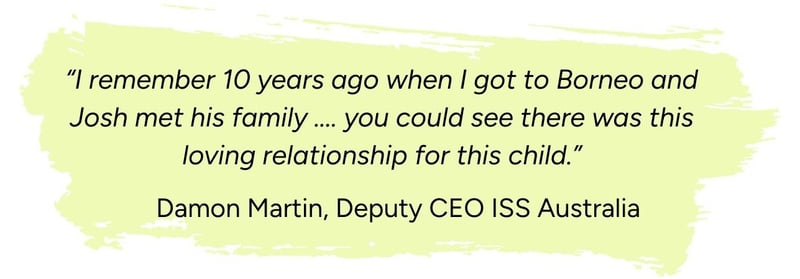
Maintaining identity
By prioritising family connections and cultural continuity, ISS helps ensure that children in care don’t lose their sense of identity and language. While efforts have been made to support Aboriginal and Torres Strait Islander children through cultural plans (although much more needs to be done), children from multicultural backgrounds remain significantly underrepresented in Australian research, policy and practice.
ISS’s work includes supporting the development of cultural plans for children from diverse backgrounds, equipping carers in maintaining cultural identity, and providing training to child protection practitioners on culturally responsive casework.
Engaging local expertise
Many Western countries, including Australia, continue the outdated practice of sending social workers abroad to assess prospective kinship carers. This approach is culturally insensitive and implies that Western systems are superior. It may even be illegal in some countries if the caseworker doesn’t meet local professional licensing requirements. Best practice dictates that assessments be conducted by qualified local social workers who are best placed to assess carers within their own cultural, legal, and systemic context. Local professionals offer shared language, cultural understanding, and in-depth knowledge of child protection, immigration, and legal frameworks, as well as available support services. They're also positioned to provide ongoing post-placement support and reporting, ensuring greater continuity and stability for the child.
ISS Australia partners with qualified local professionals who understand the legal, cultural, and family dynamics in their own countries, as well as available support services. They're also positioned to provide ongoing post-placement support and reporting, ensuring greater continuity and stability for the child.
Supporting transitions and ongoing care
Moving to a new home can be challenging for any child, especially when leaving behind familiar surroundings and caregivers. In international kinship care cases, these challenges are magnified by adapting to a new country, culture and environment.
ISS Australia works collaboratively with child protection agencies and ISS partners overseas to coordinate transitional planning and ongoing casework. This includes “warm referrals” to local professional support services, psychosocial education and practical support for kinship carers including trauma-informed care, guidance on cultural plan development, and support in maintaining meaningful contact with significant people in the child's life across international borders.
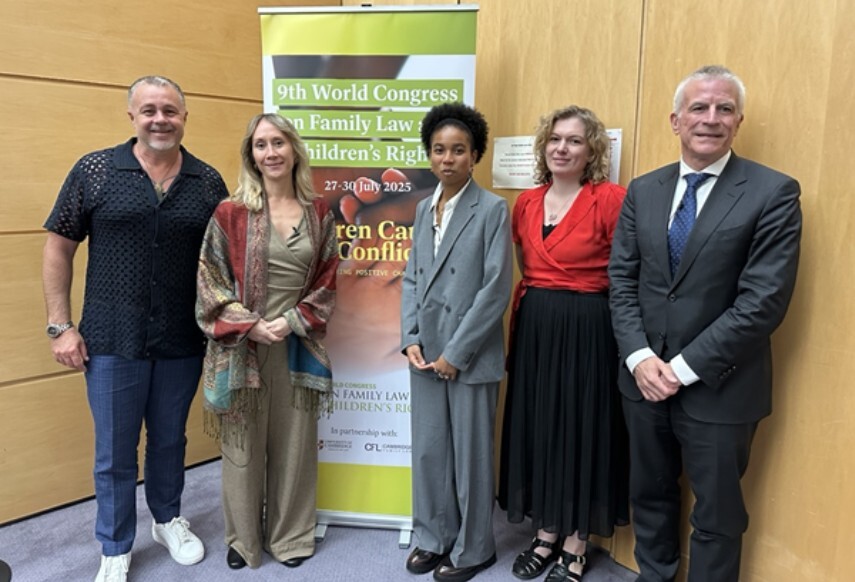
World Congress on Family Law and Children’s Rights
In July 2025, Damon Martin presented ISS’s international kinship care service at the World Congress on Family Law and Children’s Rights, Cambridge University, highlighting how the ISS promotes equity in permanency for children. ISS’s Equity in Permanency principles are a set of global child protection guidelines that prioritise exploring family placements without discrimination to achieve optimal long-term outcomes. They encompass children’s rights, equality of opportunity, systemic biases, and the need for thorough planning and accountability.
At their core is a commitment to connecting children with their extended family, locally and overseas, to support their sense of identity, belonging, cultural roots, and long-term wellbeing.
The panel also featured an Expert by Experience, who shared her lived experiences navigating the complexities of identity and belonging while being raised by a family to whom she was not biologically related, in a culture and country different from her own.
To learn more about ISS’s Equity in Permanency principles and see practical case examples in action, watch the recording of the Cross-Border Family Connections webinar >> ISS Webinar Cross-border family connections - 7 principles to protect children's rights in practice
Connections matter
ISS’s work serves as a reminder that policies and practices should be designed to support and maintain the bonds that are crucial to a child's sense of self and belonging. That’s why we’re pushing for a Child Connection System - one that puts community and connection at the heart of care. ISS Australia is a great example of what this looks like in action, making sure children stay linked to family and culture, no matter where they are.
Learn more
Find out more about how ISS is transforming the lives of children in care and supporting families across borders. In addition to their international kinship care work, they provide international post adoption tracing and family reunification, family mediation, and social work support and legal services for parents affected by international parental child abduction >> International Social Service Australia (ISS Australia). ISS relies on donations to support their work >> Donate
Find out more about the Centre for Relational Care and our vision for a Child Connection System or sign up to show your support at www.centreforrelationalcare.org.au
